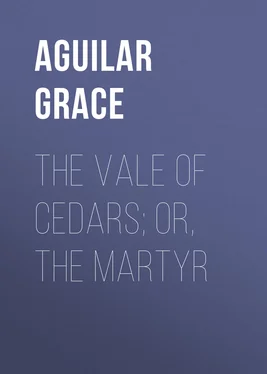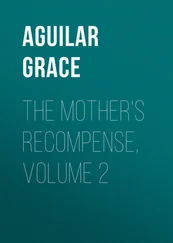Grace Aguilar - The Vale of Cedars; Or, The Martyr
Здесь есть возможность читать онлайн «Grace Aguilar - The Vale of Cedars; Or, The Martyr» — ознакомительный отрывок электронной книги совершенно бесплатно, а после прочтения отрывка купить полную версию. В некоторых случаях можно слушать аудио, скачать через торрент в формате fb2 и присутствует краткое содержание. Жанр: Альтернативная история, foreign_antique, foreign_prose, Исторические приключения, на английском языке. Описание произведения, (предисловие) а так же отзывы посетителей доступны на портале библиотеки ЛибКат.
- Название:The Vale of Cedars; Or, The Martyr
- Автор:
- Жанр:
- Год:неизвестен
- ISBN:нет данных
- Рейтинг книги:3 / 5. Голосов: 1
-
Избранное:Добавить в избранное
- Отзывы:
-
Ваша оценка:
- 60
- 1
- 2
- 3
- 4
- 5
The Vale of Cedars; Or, The Martyr: краткое содержание, описание и аннотация
Предлагаем к чтению аннотацию, описание, краткое содержание или предисловие (зависит от того, что написал сам автор книги «The Vale of Cedars; Or, The Martyr»). Если вы не нашли необходимую информацию о книге — напишите в комментариях, мы постараемся отыскать её.
The Vale of Cedars; Or, The Martyr — читать онлайн ознакомительный отрывок
Ниже представлен текст книги, разбитый по страницам. Система сохранения места последней прочитанной страницы, позволяет с удобством читать онлайн бесплатно книгу «The Vale of Cedars; Or, The Martyr», без необходимости каждый раз заново искать на чём Вы остановились. Поставьте закладку, и сможете в любой момент перейти на страницу, на которой закончили чтение.
Интервал:
Закладка:
CHAPTER VI
"Oh! praise me not—
Look gently on me, or I sink to earth
Not thus."
It was the custom of the inmates of the Vale of Cedars, once in every year, and generally about the season of Michaelmas, to celebrate a festival, which ordained the erection of a booth or tent of "branches of thick trees," in which for seven days every meal was taken, and greater part of the day (except the time passed in the little Temple) was spent. Large branches of the palm and cedar, the willow, acacia, and the oak, cut so as to prevent their withering for the seven days, formed the walls of the tent; their leaves intermingling over head, so as to form a shelter, and yet permit the beautiful blue of the heavens to peep within. Flowers of every shade and scent formed a bordering within; and bouquets, richly and tastefully arranged, placed in vases filled with scented earth, hung from the branches forming the roof. Fruit, too, was there—the purple grape, the ripe red orange, the paler lemon, the lime, the pomegranate, the citron, all of which the vale afforded, adorned the board (which for those seven days was always spread within the tent), intermingled with cakes made by Marie.
This was one of the festivals for which many of the secret race would visit the vale; but it so happened that, this year, Manuel, his child, and their retainers, kept it alone—a source of disappointment and anxiety to the former, whose health was rapidly (but still to his child almost invisibly) failing. At the close of the solemn fast which always preceded by five days this festival of rejoicing, he had had a recurrence of his deathlike fits of insensibility, longer and more alarming than usual; but he had rallied, and attributed it so naturally to his long fast, that alarm once more gave place to hope in the heart of his daughter. Not thus, however, felt her father—convinced that death could not be long delayed, he but waited for his nephew's appearance and acknowledged love for his cousin, at once to give her to him, and prepare her for the worst. Parental anxiety naturally increased with every hour that passed, and Ferdinand appeared not.
It was the eve of the Sabbath; one from which in general all earthly cares and thoughts were banished, giving place to tranquil and spiritual joy. The father and daughter were alone within their lovely tent, but both so wrapt in evidently painful thought, that a strange silence usurped the usual cheerful converse. So unwonted was the anxious gloom on Manuel's brow, that his child could bear it no longer, and flinging her arms round his neck, she besought him in the tenderest accents to confide in her, as he had ever done, since her mother's death, to tell her what so pained him—might she not remove it? Henriquez could not resist that fond yet mournful pleading. He told her, that he felt health was departing, that death seemed ever hovering near, but that its pain, its care, would all depart, could he behold his long-cherished wish fulfilled, and his Marie the wife of Ferdinand, whose every look and tone during his last visit had betrayed his devoted love.
Marie heard; and her cheek and lips blanched to such ashy whiteness, that her father in alarm folded her to his breast; and sought to soothe a grief, which he believed was occasioned merely by the sudden and fearful thought of his approaching death; and sought to soothe, by a reference to the endearing love, the cherished tenderness which would still be hers; how Ferdinand would be to her all, aye more than all that he had been, and how, with love like his, she would be happier than she had been yet. Much he said, and he might have said still more, for it was long ere the startled girl could interrupt him. But when he conjured her to speak to him, not to look upon his death so fearfully, the beautiful truth of her nature rose up against the involuntary deceit. It was not his death which thus appalled her; alas—alas!—and she hated herself for the fearful thought—she had almost lost sight of that, in the words which followed. Breaking from his embrace, she sunk down on her knees before him, and buying her face upon his hand, in broken accents and with choking sobs, revealed the whole. How could she do her noble kinsman such fearful wrong as to wed him, when her whole heart, thoughts, nay, life itself, seemed wrapt in the memory of another? And that other! Oh! who, what was he? Once she looked up in her father's face, but so fearful were the emotions written there—wrath struggling with love, grief, pity, almost terror—that hastily she withdrew her glance, and remained kneeling, bent even to the dust, long after the confession had been poured forth, waiting in fear and anguish for his words.
"Marie, Marie! is it my Marie, my sainted Miriam's, child, who thus speaks? who hath thus sinned sole representative of a race of ages, in whose pure thoughts such fearful sin hath never mingled. My child so to love the stranger as to reject, to scorn her own! Oh God, my God, why hast thou so forsaken me? Would I had died before!" And the heavy groan which followed, confirmed the anguish breathed in those broken words.
"Father!" implored the unhappy girl, clasping his knees in an agony of supplication, though she raised not her head—"Oh my father! in mercy do not speak thus! Words of wrath, of reproach, fearful as they are from thee, yet I can bear them, but not such woe! Oh, think what I have borne, what I must still bear. If I have sinned, my sin will bring, nay, it has already brought its own chastisement. Speak to me but one word of love—or, if it must be, wrath.—but not, not such accents of despair!"
Her father struggled to reply; but the conflux of strong emotion was too powerful, and Marie sprung up to support him as he fell. She had often seen him insensible before, when there appeared no cause for such attacks; but was it strange that at such a moment she should feel that she had caused it?—that her sin perchance had killed her father; he might never wake more to say he forgave, he blessed her,—or that in those agonized moments of suspense she vowed, if he might but speak again, that his will should be hers, even did it demand the annihilation of every former treasured thought! And the vow seemed heard. Gradually and, it appeared, painfully life returned. His first action was to clasp her convulsively to his heart; his next, to put her gently yet firmly from him, and bury his face in his hands, and weep.
No sight is more terrible, even to an indifferent spectator, than to behold tears wrung from the eyes of man—and to his child it was indeed torture. But she controlled the choking anguish—calmly and firmly she spoke, and gradually the paroxysm subsided.
"That I have sinned in loving a stranger thus, I have long felt," she said; "and had I been aware of the nature of these feelings, they should never have gained ascendency. But I awoke too late—my very being was enchained. Still I may break from these engrossing thoughts—I would do so—pain shall be welcome, if it may in time atone for the involuntary sin of loving the stranger, and the yet more terrible one of grieving thee. Oh, my father, do what thou wilt, command me as thou wilt—I am henceforth wholly thine."
"And thou wilt wed Ferdinand, my child?"
"Would he still wish it, father, if he knew the whole? And is it right, is it just, to wed him, and the truth still unrevealed? Oh, if he do love me, as you say, how can I requite him by deceit?"
"Tell him not, tell him not," replied Henriquez, again fearfully agitated; "let none other know what has been. What can it do, save to grieve him beyond thy power to repair? No, no. Once his, and all these fearful thoughts will pass away, and their sin be blotted out, in thy true faithfulness to one who loves thee. His wife, and I know that thou wilt love him, and be true, as if thou hadst never loved another—"
Читать дальшеИнтервал:
Закладка:
Похожие книги на «The Vale of Cedars; Or, The Martyr»
Представляем Вашему вниманию похожие книги на «The Vale of Cedars; Or, The Martyr» списком для выбора. Мы отобрали схожую по названию и смыслу литературу в надежде предоставить читателям больше вариантов отыскать новые, интересные, ещё непрочитанные произведения.
Обсуждение, отзывы о книге «The Vale of Cedars; Or, The Martyr» и просто собственные мнения читателей. Оставьте ваши комментарии, напишите, что Вы думаете о произведении, его смысле или главных героях. Укажите что конкретно понравилось, а что нет, и почему Вы так считаете.












